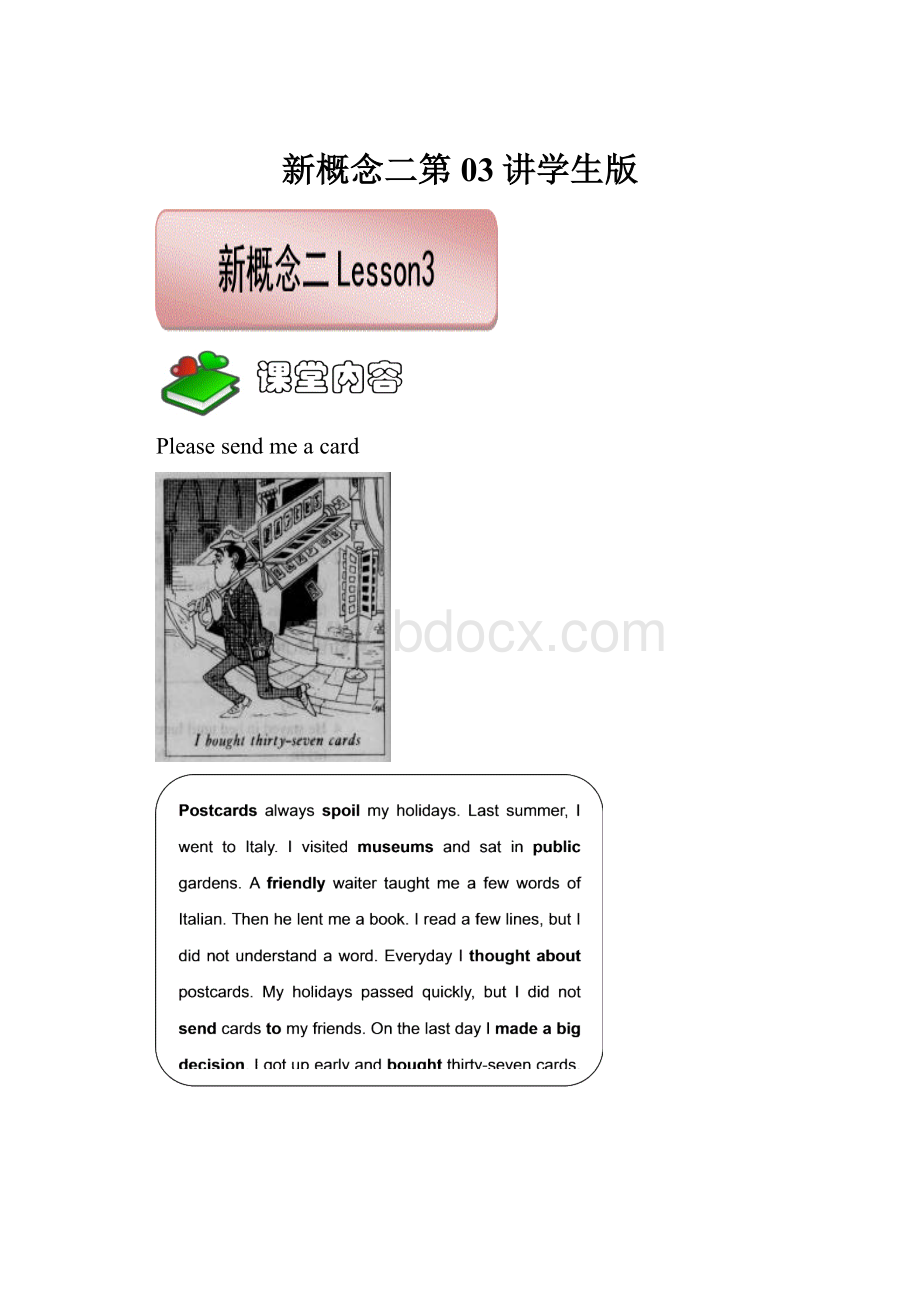新概念二第03讲学生版.docx
《新概念二第03讲学生版.docx》由会员分享,可在线阅读,更多相关《新概念二第03讲学生版.docx(23页珍藏版)》请在冰豆网上搜索。

新概念二第03讲学生版
Pleasesendmeacard
Part1Basicwordsandexpressions
1.sendsb.sth.=sendsth.tosb.寄/送给某人某物
Iwanttosendabunchofflowerstomymomasherbirthdaygift.
Iwanttosendmymomabunchofflowersasherbirthdaygift.
类似的动词还有give,lend,buy等。
我来试一试
give
lend
buy
Exercise1
按照例句改写以下句子。
1.Helentmeabook.Helentabooktome.
2.Shesentthemaletter.
3.Hismotherboughtatieforhin.
4.Canyoubringapresentforme?
5.Shepassedsomesalttome.
2.postcardn.明信片
greetingcard贺卡
businesscard名片
Christmascard圣诞卡
cashcard现金卡、工资卡
明信片的历史
明信片的问世,距今已有130多年的历史。
据史籍载,1865年10月的一天,有位德国画家在硬卡纸上画了一幅极为精美的画,准备寄给他的朋友作为结婚纪念品。
但是他到邮局邮寄时,邮局出售的信封没有一个能将画片装下。
画家正为难时,一位邮局职员建议画家将收件人地址、姓名等一起写在画片背面寄出,果然,这没有信封的“画片”如同信函一样寄到了朋友手里。
这样,世界上第一张自制“明信片”就悄然诞生了。
从这一点来说,明信片是艺术家和邮政职员的共同发明。
同年11月30日,在德意志邮政联合会的一次代表大会上,有人提议,为了写信方便,可以使用一种不需要套封的信件——明信。
但因代表们意见不一,此提议未被采纳。
1869年,奥地利一位博士发表文章建议,应该开发明信片,并将其列为印刷品邮件,以降低邮费价格。
奥地利邮政部采纳了他的建议。
同年10月1日,明信片在维也纳邮局正式发行。
因此奥地利成为世界上发行明信片最早的国家。
由于明信片使用简便,邮资便宜,深受人们欢迎,奥地利仅3个月就投寄了300多万张。
德国邮政部门闻讯后大吃一惊后悔不已,并于1870年7月正式发行了明信片。
紧接着,英、美、法、瑞士等国的明信片也相继问世。
3.spoil(spoilt,spoiltv.使索然无味,宠爱,溺爱
spoiled,spoiled)谐音记忆:
撕破了→损坏,破坏
Therainspoiltmypainting.
She’sanonlychild,buttheydidn’treallyspoilher.
4museumn.博物馆
museum=m-use-um(两边加起来是mum,中间是use)
theBritishMuseum大英博物馆
historicalmuseum历史博物馆
PalaceMuseum故宫
5publica.公共的,公开的,公众的(第一课中讲过,此处不做详细介绍)
6friendlya.友好的
friendfriendshipfriendlyunfriendly
Eg:
Heisfriendlytousall.
makefriends交朋友
Iwanttomakefriendswithlovelyanimals.
environmentalfriendly对环境友好的
Paperbagsareenvironmentfriendly.
7afew
可与复数可数名词连用,表示肯定,意为“一点、几个”:
Thepolicewouldliketoaskhimafewquestions.警察要问他几个问题。
Motheriscominginafewdays.妈妈过几天就要来了。
同时扩展:
few/alittle/little的用法
8Thenhelentmeabook.之后他借给我一本书。
像send,buy,give等动词一样,lend可以有两个宾语:
一个直接宾语(通常指物),一个间接宾语(通常指人)。
在这句话中,lend的直接宾语为abook,间接宾语为me。
Wouldyoulendmeyourpen?
YesterdayIlentmydictionarytoMary.
扩展lend/borrow
lend借出,借给别人;borrow借入,从别人那里借来东西
borrow
lend
9thinkabout考虑,思考
thinkof考虑;思考(=thinkabout)
Eg:
I’mthinkingabouthowtogotoschooltomorrow.
我的例子:
thinkbetter/highly/wellofsb.对某人印象好;看重某人
Eg:
ChinesepeoplethinkhighlyofChairmanMao.
我的例子:
thinklittle/poorlyof看轻;看不起
Eg:
Billyoftenstealthingsandhisneighborsthinkpoorlyofhim.
我的例子:
我决定了!
10decisionn.决定
makea(big)decision做出一项(重大)决定
Eg:
LastnightImadeabigdecisionthatIwouldliketobeanexcellentman.
Youhavemade/takenawrongdecision.
我的例子:
cometo/arriveat/reachadecision做出决定
Eg:
Atlasttheycometoadecision:
workharder.
我的例子:
decidetodosth.决定去做某事
Eg:
Idecidetotravelthisweek!
我的例子:
11wholea.整个的
holen.洞(发音相同)
Thewholeofthatareaknewthewholetruthfromthewholestory.
onthewhole总的来说,从总体上看
Eg:
Ouropinionsareonthewholethesame.
Onthewhole,youareagoodstudent.
我的例子:
12singlea.唯一的,单一的,单身的
asinglebed单人床
asingleticket单程票
Ididn’tseeasinglepersonintheroom.
Heisoverfiftyandremainssingle.
Exercise2
1.Pleasegive__________.
A.tomeitB.ittomeC.metoitD.toitme
2.Iwrote__________.
A.lettermyuncleB.alettermyuncleC.myuncleletterD.myunclealetter
3.I__________Mary﹩300lastweek.
A.lentB.borrowedC.borrowD.lend
4.BeforeChristmasmyparentsbuy_________.
A.memanypresentsB.muchpresentmeC.manypresentsmeD.memuchpresent
5.Pleasepass_________.
A.thesaltmeB.methesaltC.tothesaltmeD.tomethesalt
6.Shesentamessage__________yesterday.
A.inmeB.metoC.meinD.tome
Part2Structureandvocabulary
1.LastsummerhewenttoItaly.Shewas______Italylastsummer.
A.atB.toC.inD.on
2.____himafewwordsofItalian?
Thewriter.
A.WhotaughtB.WhodidtaughtC.WhatdidheteachD.Whomdidheteach
3.Hewasafriendlywriter.Hespoketothewriter______.
A.friendB.asfriendsC.likefriendsD.inafriendlyway
4.Thewriter_______afewlines,buthedidn’tunderstandaword.
A.readsB.readC.redD.reading
5.Hespentthewholedayinhisroom.Hewasinhisroom____day.
A.theholeB.theallC.allD.allof
6.A.waiterusuallyworksina____.
A.publicgardenB.shopC.restaurantD.privatehouse
7.Thewriterlenthimabook.He____abookfromthewriter.
A.lentB.borrowedC.tookD.stole
8.Onthelastdayhemadeabigdecision.Itwasthe_____dayofhisholiday.
A.finalB.endC.latestD.bottom
9.Hemadeabigdecision.He_____.
A.thoughtaboutitB.madeuphismindC.changedhismindD.madeawish
10.Hedidn’twriteasinglecard.Sohe_____.
A.wroteonlyoneB.didn’twriteevenoneC.wrotejustoneD.wroteallthecardsexceptone
Part3Grammar:
一般过去时
一、定义:
一般过去时表示过去发生的动作或存在的状态。
1.一般过去时的构成:
主语+动词过去式+其它。
如:
Theyhadagoodtimeyesterday.
2.一般过去时常用的时间状语
amomentago(刚才),yesterdaymorning,lastnight/week,thedaybeforeyesterday(前天),justnow(刚才)等。
3.动词过去式的变化规律
(1)动词过去式的变化可速记为“直”、“去”、“双”、“改”四字诀。
①一般情况下在动词原形后直接加-ed。
如:
want→wantedplay→played
②以不发音的字母e结尾的动词,去掉e再加-ed。
如:
hope→hopedlive→lived
③重读闭音节单词需双写最后一个辅音字母再加-ed。
如:
stop→stopped
④以辅音字母+y结尾的动词变y为i,再加-ed。
如:
study→studiedworry→worried
◆规则动词过去式的读音也有规律可循。
请记住:
清后[t],元浊[d],[t][d]之后读[id]。
①清辅音[p][k][ʃ][s]等后,ed要读[t]。
如:
workedfinished
②元音或浊辅音[b][g][v][z][m]等后,ed要读[d]。
如:
livedcalled
③[t]或[d]后,ed读[id]。
如:
startedneeded
2)不规则动词变化,要逐一熟记。
be动词过去式有两种形式,主语是第一、三人称单数形式使用was,其他人称用were。
不规则动词时态变化表
变化类型
Example
A---A---A型
(现在式、过去式和过去分词同形)
costcostcost花费
cutcutcut割,切
hithithit打
letletlet让
putputput放下
readreadread读
hurthurthurt伤
A---A---B型(现在式和过去式同形)
beatbeatbeaten打
A---B---A型
(现在式和过去分词同形)
comecamecome来
becomebecamebecome变
runranrun跑
A---B---B型
(过去式和过去分词同形)
(1)词原形后加一个辅音字母d或t构成过去式或过去分词
burnburntburnt燃烧
learnlearned/learntlearned/learnt学习
meanmeantmeant意思是
hearheardheard听见
(2)词原形的最后一个辅音字母“d”改为“t”构成过去式或过去分词
buildbuiltbuilt建筑
lendlentlent借给
loselostlost失去
sendsentsent送
spendspentspent花费
(3)其他
paypaidpaid付
laylaidlaid下蛋
saysaidsaid说
bringbroughtbrought带来
buyboughtbought买
thinkthoughtthought想
sleepsleptslept睡
keepkeptkept保持
sweepsweptswept扫
standstoodstood站
understandunderstoodunderstood明白
winwonwon得胜
catchcaughtcaught抓住
teachtaughttaught教
feelfeltfelt觉得
fightfoughtfought战斗
findfoundfound发现
getgotgot得到
hanghanged/hunghanged/hung绞死,挂
havehadhad有
holdheldheld盛,握
leaveleftleft离开
makemademade制造
meetmetmet遇见
sellsoldsold卖
telltoldtold告诉
smellsmelt/smelledsmelt/smelled嗅,闻
sitsatsat坐
flyflewflown飞
A---B---C型
(现在式、过去式和过去分词都不同)
(1)动词原形后加-n或-en构成过去分词。
eatateeaten吃
fallfellfallen落下
givegavegiven给
taketooktaken拿
seesawseen看见
writewrotewritten写
rideroderidden骑
drivedrovedriven驾驶
throwthrewthrown抛,扔
blowblewblown吹
growgrewgrown生长
knowknewknown知道
drawdrewdrawn拉,绘画
showshowedshown展示
(2)过去式加-n或-en构成过去分词。
speakspokespoken说话
breakbrokebroken破碎,折断
stealstolestolen偷
freezefrozefrozen冻结
wakewaked/wokewaked/waken醒
choosechosechosen选择
forgetforgotforgotten忘记
(3)变单词在重读音节中的元音字母“i”分别为“a”(过去式)和“u”(过去分词)
beginbeganbegun开始
ringrangrung按铃
singsangsung唱
swimswamswum游泳
drinkdrankdrunk饮
(4)其他不规则动词的变化
be(am,is)was/werebeen是
be(are)werebeen是
dodiddone做
gowentgone去
lielaylain躺
wearworeworn穿
Exercise3
1.写出下列动词的过去式。
1.comeflyplantare
2.play gomaketake
3.drinkdanceworrycarry
4.tasteeatdrawput
5.throwkickpass do
2.Be动词的过去式练习。
1.I______adoctorfiveyearsago.
2.She_______verysadyesterday.
3.They_______verytiredatthistimeyesterdayevening.
4.LucyandJohn________lateforschoolthismorning.
5.Thereaverybigtreeherebefore.
4.一般过去时的用法:
一般过去时的基本用法
1)表示过去某个特定时间发生的动作或存在的状态。
如:
Hesuddenlyfellillyesterday.昨天他突然生病了。
Theenginestoppedbecausethefuelwasusedup.发动机因燃料用光而停机了。
2)表示过去经常发生的动作或存在的状态。
如:
Iwrotehomeonceaweekatcollege.我上大学时每周给家里写一封信。
Hewasalreadyinthehabitofreadingwidelyinhisboyhood.
他童年时就养成了广泛阅读的习惯。
◆注:
表示过去的习惯性动作,除了用过去时外,还可以用usedto或would来表示。
如:
SheusedtostudylateintothenightwhenshewasinSeniorThree.她上高三时经常学习到深夜。
Hewouldsitforhoursdoingnothing.过去他常常一坐几个钟头什么事也不做。
3)表示过去连续发生的一系列动作。
如:
Sheenteredtheroom,pickedupamagazineandlookedthroughitcarefully.
她走进房间,拿起一本杂志,认真地翻阅了起来。
Thestudentsgotupearlyinthemorning,didmorningexercisesandthenreadEnglishaloudintheopenair.学生们很早起床,做早操,然后在室外朗读英语。
Exercise4
用正确动词形式填空。
1.I_________(have)anexcitingpartylastweekend.
2.---_________she_________(practice)herguitaryesterday?
---No,she_________.
3.---What________Tom________(do)onSaturdayevening?
---He________(watch)TVand__________(read)aninterestingbook.
4.Theyall_________(go)tothemountainsyesterdaymorning.
5.She_________(notvisit)herauntlastweekend.
She________(stay)athomeand_________(do)somecleaningyesterdayafternoon.
6.---When________you_________(write)thissong?
---I__________(write)itlastyear.
7.Myfriend,Carol,___________(study)forthemathtestand__________(practice)Englishlastnight.
8.---________Mr.Li__________(do)theprojectonMondaymorning?
---Yes,he_________.
9.---How_________(be)Jim'sweekend?
---It_________(benot)bad.
10.---